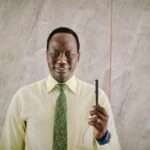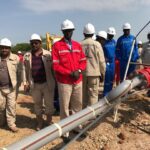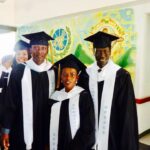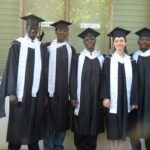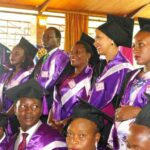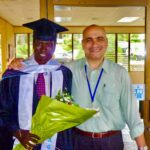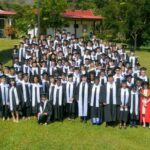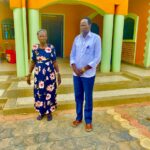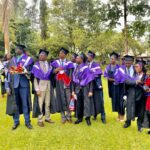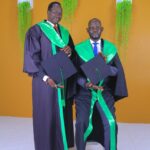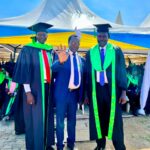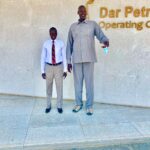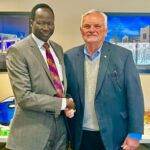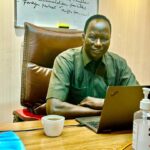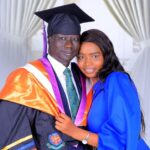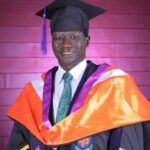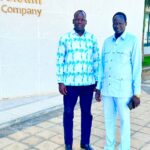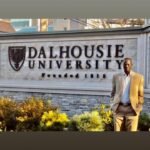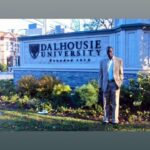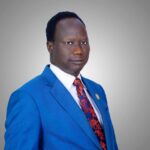- May 1999 – December 2000: Team Organizer/leader, UNHCR, Fugnido Refugee camp.
- April 1995 – June 1996: Assistant Community Health worker, WHO, Lankien, Jonglei Province
Ladies and Gentlemen,
I am delighted to introduce myself: I am Peter Reat Gatkuoth. Hailing from the historic village of Waat in Jonglei State, nestled within South Sudan’s Greater Upper Nile Region, I am deeply rooted in a rich cultural heritage. Waat holds profound significance as the ancestral home of Ngundeng Bong, a revered prophet in South Sudan and my great-grandfather. Amidst the trials of a conflict-ridden environment, I embarked on a transformative journey, initiated into military training at the tender age of 15, where I became a child soldier within the Red Army.
In recent years, my dedication has been channeled into serving the Ministry of Petroleum in South Sudan, where I have traversed various sectors within the Oil and Gas industry. From leading as Section Head for Policy and Services to navigating the intricacies of Human Resource Management, my journey has been enriched by experiences within esteemed organizations such as Nile Petroleum Corporation, Nile Drilling, and Dar Petroleum Operating Company.
Fueled by an unwavering passion to address Africa’s challenges, I am currently pursuing a doctoral degree specializing in Leadership and Policy. This dynamic field enthralls me for its potential to ignite progress not only within my homeland but across the continent. Through this academic pursuit, I aim to cultivate indispensable skills for future leadership roles while contributing to the discourse on African issues.
My upbringing, rooted in democratic principles, profoundly shapes my approach to leadership. Inspired by my parents’ unwavering advocacy for democratic governance amidst South Sudan’s struggle against governance steeped in Islamic principles, I hold steadfast to the transformative power of democratic leadership. This guiding principle informs both my academic endeavors and professional undertakings.
Beyond my corporate engagement, I serve as a lecturer at the University of Juba. My academic voyage is marked by diverse pursuits, including degrees in Sociology, International Law and Human Rights, Oil and Gas Law, Public Policy, and Environmental Health and Safety Management. This multidisciplinary approach underscores my commitment to addressing multifaceted societal challenges.
At present, I am deeply immersed in a research endeavor examining the long-term impacts of international collaborations on higher education in South Sudan. Focusing on esteemed institutions like the University of Juba and Upper Nile University, this study seeks to unravel the transformative effects of collaborative initiatives on institutional development and educational outcomes, offering invaluable insights for strategic planning.
In the spirit of M. Gandhi’s non-violent ethos, I aspire to ignite inspiration, foster learning, and cultivate transformative leadership within society. With unwavering determination and dedication, I endeavor to pave the way towards a brighter future, not only for South Sudan but for all who seek progress.
Thank you.
Leadership and Policy,
Thesis Proposal/Title: Evaluating Long-Term Effects of International Collaborations
on Higher Education institutions in Juba: A Case Study of The University of Juba and Upper Nile
University
Thesis Title: Assessing the Impact of Occupational Safety and Health
on Employees Performance in Oil and Gas Industry: A case study of Nile Petroleum Corporation Ltd - South
Sudan (2024)
Thesis Title: Assessing Regulatory Awareness, Enforcement and Compliance with the Oil and
Gas Laws: A case of Unity State – South Sudan” (2023)
Thesis title: Socio Economic Impact of Oil & Gas Industry on National Development: A Case Study of Melut County,
Upper Nile State, South Sudan (2022).
Thesis title:
Analysis of the Law Regulating Environmental Impact of the Oil and Gas Production Activities in Upper
Nile Region – South Sudan (2019).
Thesis title: Discrimination against the Older Persons: The Case Study of Human Rights abuse of
older Immigrants and Refugee Workers in Canada (2012).
ISP/thesis title: The
Nuer Traditions, Social Life and culture: A Case Study of the Socio-cultural views of the Nuer people in
the villages (2008).
1. Certificate of Advance Human Resources Management, Policy and Strategy, Pan African Training Centre, 3rd
July 2015.
2. Certificate of Petroleum Exploration and Production, offered by NeXT, September 2014.
3. Certificate of Basic Payroll processing, Sage VIP Africa, August 2014.
4. Certificate of International Refugee Law, University for Peace and UNHCR, May 2012
5. Certificate of International Humanitarian Law, University for Peace, December 2011
6. Cerficate of workplace Hazard Material Information System (WHMIS), Enform, January 2010.
7. Certificate of Confined Space Entry Monitor, Enform, May 2010 .
8. Certificate of H2S Alive Certificate, Enform, May 2010.
9. Certificate of Standard First Aid And CPR/AED, Enform, June 2010
10. Certificate of Horticultural Production, UNHRC, July 1998.
11. Certificate of Managing crop production, UNHCR, November 1997.
12. Certificate of animal Health and sanitation, UNHCR, April, 1996.
13. Certificate of Agro-forestry training, UNHCR, 1996.
-
English
-
Arabic
-
French
- ADS 710: Organizational Theory, Development & Strategic Change
- ADS 730: Organizational Assessment and Accountability
- ADS 740: Leadership in a Global Society
- ADS 760: Ethical Practices in Leadership and Policy
- ADS 770: Economic and Financial Policy Leadership in a Global Society
- ADS 840: Doctoral Seminar
- ADS 710: Organizational Theory, Development & Strategic Change
- ADS 720: Process, Politics and Evaluation of Public and Social Policy
- ADS 750: Diversity in Organizations
- ADS 740: Leadership in a Global Society
- ADS 760: Ethical Practices in Leadership and Policy
- ADS 770: Economic and Financial Policy Leadership in a Global Society
- ADS 805: Research and Statistics
- ADS 840: Doctoral Seminar
- ADS 710: Organizational Theory, Development & Strategic Change
- ADS 730: Organizational Assessment and Accountability
- ADS 770: Economic and Financial Policy Leadership in a Global Society
- ADS 840: Doctoral Seminar
- ADS 720: Process, Politics and Evaluation of Public and Social Policy
- ADS 770: Economic and Financial Policy Leadership in a Global Society
- ADS 807: Geographical Information Systems and Research
- ADS 810: Research Seminar
- ADS 830: Advanced Qualitative Methods
- ADS 840: Doctoral Seminar
- ADS 850: Dissertation
- ADS 760: Ethical Practices in Leadership and Policy
- ADS 770: Economic and Financial Policy Leadership in a Global Society
- ADS 805: Research and Statistics
- ADS 810: Research Seminar
- ADS 820: Advanced Quantitative Research
- ADS 830: Advanced Qualitative Methods
- ADS 840: Doctoral Seminar
- ADS 850: Dissertation
- ADS 852: Dissertation
- ADS 855: Dissertation
- ADS 720: Process, Politics and Evaluation of Public and Social Policy
- ADS 730: Organizational Assessment and Accountability
- ADS 740: Leadership in a Global Society
- ADS 760: Ethical Practices in Leadership and Policy
- ADS 770: Economic and Financial Policy Leadership in a Global Society
- ADS 807: Geographical Information Systems and Research
- ADS 830: Advanced Qualitative Methods
- ADS 840: Doctoral Seminar
- ADS 740: Leadership in a Global Society
- ADS 770: Economic and Financial Policy Leadership in a Global Society
- ADS 830: Advanced Qualitative Methods
- ADS 840: Doctoral Seminar
ADS 710: Organizational Theory, Development, and Strategic Change (David Veres, Ph.D)
Course Description
In this course, candidates will study various organizations in the context of their environment to understand the internal and external processes that promote and inhibit organizational change. The focus is on the essential role that organizational leaders play in identifying these processes, guiding their development, and filtering and disseminating challenges and other information to the organization. Special attention will be given to the development of organizational resources, especially human resources. The use of contemporary resources will be reinforced by extensive individual research investigations and interactions with library reference personnel throughout the course.
The theme around which the course will be delivered is cooperative behavior and organizational adaptation. In particular, we will examine organizational leadership in relation to successful change management and the achievement of strategic outcomes in rapidly changing internal and external environments. There will be a special focus on public, non-profit, and cooperative organizations.
Downloads
ADS 720: Process, Politics and Evaluation of Public and Social Policy (Dr. Rob Leone).
Course Description
This course will provide candidates with an opportunity to reflect on the theory, practice, and analysis of public policy. Candidates will study current issues such as educational reforms, discrimination in hiring and housing, funding of public and private organizations, labor negotiations, personal health programs, clean environment policies, and insurance concerns. They will analyze several decision-making models used at the international, federal, regional, state, and local levels. Of special concern is the role that politics plays in the development and implementation of policies.
Method of Teaching
This course is framed within a constructivist perspective that embraces the belief that knowledge is socially constructed. Learning is viewed as a developmental process that is enhanced when students learn to view problems and issues from multiple perspectives and construct their knowledge from their own interpretations of numerous diverse pieces of evidence. Teaching approaches are directed toward open-ended inquiry, critical thinking, reflection, and social interactions.
Downloads
ADS 730A: Organizational Assessment and Accountability (Dr. John E. McKenna)
Course Description
This course is designed to introduce doctoral students to organizational assessment and accountability, providing them with conceptual and practical tools to conduct organizational assessments and develop accountability measures. Students will also study the role that research and data play in accountability, assessment, and policy development.
Method of Teaching
This course is framed within a constructivist perspective that embraces the belief that knowledge is socially constructed. Learning is viewed as a developmental process that is enhanced when students learn to view problems and issues from multiple perspectives, constructing knowledge from their own interpretations and numerous pieces of evidence. Teaching approaches are directed toward open-ended inquiry, critical thinking, reflection, and social interaction. Instructional methods may include whole class and small group discussions, individual and cooperative activities, presentations by instructors and classmates, internet and library searches, observations of instructional videos, and research.
Downloads
ADS 740: Leadership in Global Society (Dr. Mike Smith PhD, Professor Emeritus).
Course Description
This course is designed to facilitate reading and discussion of various classic and current leadership theories. The perspective taken in this course is that the leader cannot think only in terms of local (micro) and regional (macro) issues, but must also consider the impact of world events (mega issues) on organizational leaders and how both the leader and the organization may, in turn, impact global society. This course is framed within a constructivist perspective, encouraging candidates to learn to view local, regional, and global issues from multiple perspectives, constructing knowledge from their personal introspections as well as from their interpretations of the contemporary and future world. The use of the Internet will be an integral component of this course as candidates will be expected to communicate with organizational leaders in different parts of the world regarding the implementation and evaluation of various leadership perspectives including personal dispositions, concepts, tactics, and strategies.
Method of Teaching
This course is framed within a constructivist perspective that embraces the belief that knowledge is socially constructed. Learning is viewed as a developmental process that is enhanced when students learn to view problems and issues from multiple perspectives, constructing knowledge from their own interpretations using contemporary data and numerous references. Teaching approaches are directed toward open-ended inquiry, critical thinking, reflection, and social interaction. Instructional methods may include whole class and small group discussions, individual and cooperative activities, presentations by instructors and classmates, internet and library searches, observations of instructional videos, and research.
Downloads
ADS 750: Diversity in Organizations (Dr. Walter S. Polka and Dr. Sushma Marwaha)
Course Description
This course is designed to provide the candidate with an understanding of the current research on how diversity among stakeholders in organizations affects the organizations and how the organizations impact diverse groups. Candidates will utilize critical theories to analyze the strategies, techniques and programs that are currently used by business, education, and public service organizations to create and sustain ethical, human, and professional organizations reflective of contemporary diversity. Since. Today’s labour market is not homogeneous; special emphasis will be placed on recruitment, selection, induction, and continuing development of diverse adults.
Method of Teaching
This course is framed within a constructivist perspective that embraces the belief that knowledge is socially constructed. Learning is an enhanced developmental process when students learn to view problems and issues from multiple perspectives, constructing knowledge from their own interpretations of numerous pieces of evidence. Teaching approaches are direct-involved inquiry, critical thinking, reflection, and social interaction. Instructional methods will include the whole class, lectures by the instructor and classmates, internet and library searches, and observations. Technology is an integral part of this course, and all assignments, rubrics and notes will be made available before class. As the success of the class overall depends on each individual's success, students are expected to remain up to date on their readings and assignments.
Downloads
ADS 760: Ethical Practices in Leadership and Policy (Dr. Rob Leone).
Course Description
This course is designed to look at the micro (daily activities) and macro trends of organizations in order to understand the ethical implications of the assumptions and practices that drive organizations. Candidates will examine the ethical foundations that guide the organizational leader in the creation and implementation of policy.
Method of Teaching
Downloads
ADS 770: Course Name: Economic and Financial Policy Leadership In A Global Society (Rocco Lueck, Ph.D)
Course Description
In this course, candidates will study various national and regional economies in the context of their macro-environments and will analyze their respective impact on the mega global environment as well as the reciprocal impact of global economics upon individual nation states. Specific focus will be given to global economic issues such as unemployment, inflation, interest rates, and exchange rates and their impact on capital markets, foreign exchange markets, and labor markets. In addition, the international financial environment in which contemporary international businesses operate and in which financial service providers compete will be assessed.
Method of Teaching
The class consists of a discussion of readings on the topics of international economics, international political economy, economics of leadership, and economics of organizations.
Downloads
ADS 805: Research and Statistics (Sushma Marwaha, Ph.D)
Course Description
This course is designed to introduce doctoral students to the principles and processes of research. Students will become influential consumers of research by analyzing the literature in a particular area of study and synthesizing the results into material that can be applied to diverse settings. Students will also develop research skills that they might use to assist them in their research and study. In addition, doctoral students will develop or further enhance a cheerful research disposition that will compel them to use research in their leadership positions. This first course of the cohort program includes specific exposure to the Niagara University library and its reference services by library staff to assist Ph.D. candidate research.
Method of Teaching
This course is framed within a constructivist perspective that embraces the belief that knowledge is socially constructed. Learning is viewed as a developmental process that is enhanced when students learn to view problems and issues from multiple perspectives, creating knowledge from their interpretations of numerous pieces of evidence. Therefore, teaching approaches involve open-ended inquiry, critical thinking, reflection, and social interaction. Instructional methods will include whole class and small group discussions, individual and cooperative activities, presentations by instructors and classmates, inter-net and library searches, observations of instruction videos, and research.
Downloads
ADS 807: Geographic Information Systems and Research (Dr. Yonghong Tong)
Course Description
This course is a broad and intensive study of Geographic Information Systems (GIS). Using this extensive computer-based mapping software, students will learn the nature and models of spatial data, organize, manage, and present such data, as well as plan, conduct, and present research. Applications in various professional settings will be introduced and discussed. The course will emphasize the use of GIS in administrative and policy making settings.
Method of Teaching
Downloads
ADS 810: Research Seminar (Dr. W. Polka).
Course Description
This research seminar is a semester-long professional development seminar during which candidates will participate in weekly seminars whereat prominent researchers from various disciplines will make scholarly presentations. Candidates are expected to reflect and react to the research information presented and consider personal and professional applications of the research information. An integral component of this course will be the refinement of research knowledge and reference skills of each advanced graduate student, consequently, the Niagara University Library Reference Department will play a significant role in this course.
Method of Teaching
Downloads
ADS 820: Advanced Quantitative Methods (Dr. Sushma Marwaha)
Course Description
This course is designed to provide doctoral students with theoretical and practical preparation in quantitative research. Coursework includes creating and developing hypotheses, conducting literature searches, collecting data, designing research, analyzing data using statistical techniques based on the general linear model (e.g., multiple regression, analysis of variance procedures, and factor analysis), and drawing appropriate conclusions. Participants will be provided with hands-on experiences of data analysis employing statistical software that is widely used in applied and social research. They will become familiar with the ethics of quantitative research, especially the protocols for dealing with human subjects. Participants will be expected to develop a quantitative research project.
Method of Teaching
This course is framed within a constructivist perspective that embraces the belief that knowledge is socially constructed. Learning is viewed as an enhanced developmental process when students learn to view problems and issues from multiple perspectives, constructing knowledge from their own interpretations of numerous pieces of evidence. Teaching approaches are directed toward open-ended inquiry, critical thinking, reflection, and social interaction. Instructional methods will include whole-class and small-group discussion, individual and cooperative activities, online discussions, professor presentations, Internet and library searches, and practice of statistics problems in the computer lab.
Downloads
ADS 830: Adv. Qualitative Methods (Dr. Lori V. Quigley).
Course Description
This course is designed to train students how to design, conduct, analyze, and present qualitative research.
Method of Teaching
This course is framed within a constructivist perspective that embraces the belief that knowledge is socially constructed. Learning is viewed as a developmental process that is enhanced when students learn to view problems and issues from multiple perspectives, constructing knowledge from their own interpretations numerous pieces of evidence. Teaching approaches are directed toward open-ended inquiry, critical thinking and reflection and social interaction. Instructional methods will include whole class and small group discussion, individual and cooperative activities, presentations by instructors and classmates, internet and library searches, and research. As a PhD-level course, students should expect to learn first from their own research, reactions, and reflection; second, from the insights of, and interactions with, their peers; and third, from the instructor. This class will be taught ONLINE SYNCHRONOUSLY (which means we will have online class meetings during our regularly scheduled class time). Zoom or Google for the class can be accessed through the course Canvas page. Students will need a camera and microphone to participate in the synchronous.
Downloads
ADS 840: Doctoral Seminar (Dr. Rob Leane).
Course Description
This course is taken in the final semester of a candidate's program. In regularly scheduled meetings with the professor, candidates will be assisted in developing and presenting a dissertation proposal. A reference librarian, who has been designated as the library liaison to the doctoral program, will be available to assist candidates throughout the course. Candidates will participate in a Mock First Defense during this course to prepare them for the dissertation defense protocols and procedures.
Method of Teaching
This course is framed within a constructivist perspective which embraces the belief that knowledge is socially constructed. Learning is viewed as a developmental process that is enhanced when students learn to view problems and issues from multiple perspectives and constructing their knowledge from their own interpretations of numerous diverse pieces of evidence. Teaching approaches are directed toward open ended inquiry, critical thinking, reflection, and social interactions
Downloads
Nothing Found
It seems we can’t find what you’re looking for. Perhaps searching can help.





